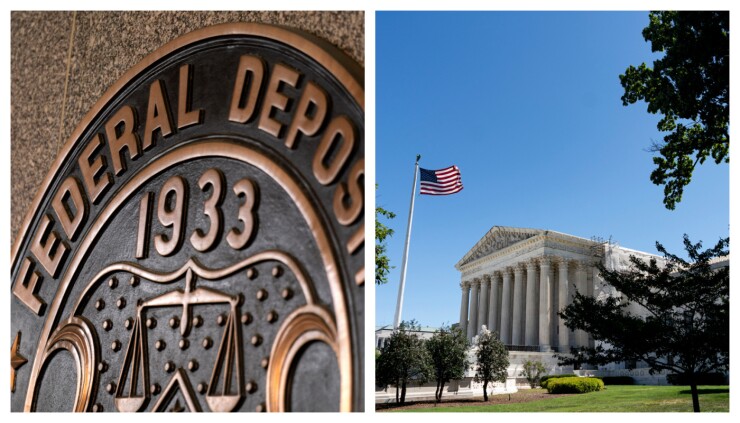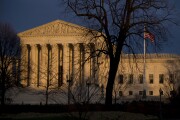
Two months after
In response to the Supreme Court's ruling, the Federal Deposit Insurance Corp. recently pared down its ambitions in a case involving alleged violations of Small Business Administration loan regulations. The FDIC said it would waive civil fines but continue to seek restitution from the man it has accused of wrongdoing.
But the two sides are continuing to battle over the implications of the Supreme Court's watershed decision. And the arguments being made on behalf of the defendant, John C. Ponte, offer a taste of the new ammunition that banks and bank employees will likely use in other enforcement cases.
""Ït's absolutely a preview of what banks are going to argue in the future," said David P. Weber, a former enforcement official at the FDIC, the Office of the Comptroller of the Currency and the Securities and Exchange Commission.
One clear upshot of the Supreme Court's 6-3 decision in SEC v. Jarkesy is that bank regulators can no longer ask administrative law judges to decide cases in which the agencies are seeking civil monetary penalties from either a bank or an individual banker. Such proceedings, the court found, violate a defendant's right to a jury trial under the Constitution's Seventh Amendment.
Bankers accused of wrongdoing frequently argue that the
Following the Supreme Court's decision in late June, experts predicted that individuals and companies accused of misconduct would test the boundaries of the ruling — including by seeking to determine whether it applies in situations where the agencies are seeking restitution or disgorgement of ill-gotten gains.
That's now happening in Ponte's case. He is trying to prevent the FDIC from moving ahead with what he characterizes as an unconstitutional enforcement case — notwithstanding the agency's recent decision to forgo its claims for $74,000 in civil monetary penalties.
"Ponte has been denied his Seventh Amendment right to a jury trial," his lawyer wrote in a complaint filed in U.S. District Court earlier this month. "Not only does he have no prospect of a jury but the FDIC can proceed with impunity knowing it will not have to face a jury."
The FDIC fired back Friday in a motion to dismiss Ponte's complaint, arguing that a jury trial is not mandatory in a case involving restitution.
"The FDIC seeks to require Ponte to repay the SBA loan applicants who were charged fees that violated the SBA's regulations," the agency wrote in its court filing. "That restitutionary remedy is equitable and does not require a jury."
Ponte came into the FDIC's crosshairs in connection with work he did as a contractor for Independence Bank in East Greenwich, Rhode Island. The FDIC alleges that he violated SBA regulations by charging excessive fees to small businesses that participated in the SBA's 7(a) loan program, and that he also took steps to make applicants appear more creditworthy than they actually were.
"The bank lost over $1.5 million when the loans defaulted at a very high rate, the SBA lost nearly $9 million, and borrowers were charged improper fees," the FDIC argued in its filing.
Ponte has said that he "strongly disagrees" with the allegations.
It's unclear whether Ponte's case will resolve the various legal issues raised by the Supreme Court's decision. Weber, a professor at Salisbury University's Perdue School of Business, predicted that the FDIC will prevail over Ponte's constitutional challenge without the judge even addressing those issues.
But Weber also expects more legal challenges to enforcement cases that bank regulators have filed. He noted that Ponte's lawyer, John Vecchione, works for a nonprofit law firm, the New Civil Liberties Alliance, that specializes in challenges to the power of administrative agencies.
Weber is also anticipating that the banking agencies will ask Congress to make certain changes to their legal authorities in response to the Supreme Court's decision. Until that happens, he said, the regulators will likely continue to battle in court over the boundaries of their powers.
"Their only other choice would be to discontinue all enforcement actions until Congress passes a fix, and that's not a particularly ideal solution," he said.






